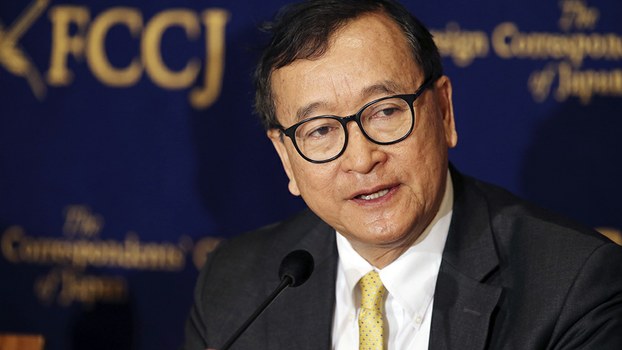




The former president of Cambodia’s now-dissolved opposition party called on Japan Friday to use its influence as his country’s largest foreign aid donor to ensure that Prime Minister Hun Sen “restore the democratic process” ahead of upcoming elections.
Hun Sen has launched a crackdown on the opposition Cambodia National Rescue Party (CNRP), NGOs and the media in recent months that is widely seen as part of a bid to guarantee that his ruling Cambodian People’s Party (CPP) remains in power following a general ballot set for July 29.
On Friday, former CNRP chief Sam Rainsy noted that both the U.S. and EU had withdrawn donor support for Cambodia’s elections, citing government actions seen as limiting democracy in the country, including the banning in November of his party—the only viable political challenger to the CPP—and the arrest of its current president, Kem Sokha.
“Japan has strong leverage to help restore the democratic process,” he told reporters in Tokyo, adding that Japan’s government is “well-placed to play the role of intermediary to help reestablish dialogue between the different Cambodian parties.”
“If Japan withdraws [electoral aid], Hun Sen will be totally isolated and Cambodia will be really in trouble.”
Despite mounting international concerns over Hun Sen’s political crackdown, Japan—which along with the EU is the largest funder of Cambodia’s 2018 elections—has said it has no intention to curtail aid ahead of the vote.
Last weekend, Japanese Foreign Affairs Minister Taro Kono traveled to Phnom Penh to meet with Hun Sen and signed deals with Kono’s counterpart, Prak Sokhonn, granting Cambodia more than U.S. $4.6 million in assistance and a loan of U.S. $86 million.
While Kono urged Hun Sen to hold a free and fair election—Japan’s consistent stance since the CNRP was dissolved—he did not raise the issue of election participation with the prime minister.
Cambodia’s government has repeatedly ruled out negotiations with the CNRP, including as recently as last week, when CPP spokesman Sok Eysan said that dialogue between the parties was impossible because the opposition had “made a big mistake” with its alleged role in a plot to overthrow Hun Sen.
Japan has already provided Cambodia’s National Election Commission (NEC) with computers to assist with its ballots and has faced criticism of its continued support from the NGO community, such as New York-based Human Rights Watch.
The world’s fourth largest foreign aid donor with an annual budget of nearly U.S. $10 billion, Japan donated 17.3 billion yen (U.S. $153 million) in loans, 8 billion yen (U.S. $71 million) in grants, and 3.4 billion yen (U.S. $30 million) in technical cooperation to Cambodia in 2015.
In addition to electoral support, Japan also provides Cambodia with a variety of aid for projects including infrastructure improvement, humanitarian assistance, and business development.
Sam Rainsy said Friday that Japanese assistance over the years “will be lost if we don’t put back on track the democratic process” in Cambodia.
He added that representatives of Japan’s business community have also expressed concerns to him because “they know that the situation in Cambodia right now is very volatile.”
“We need sustainable development and we need Japanese investors, but the Japanese investors are reluctant now [and think] ‘we cannot invest in such an environment,’” he said, adding that “stability now rests on democracy.”
“We call on the Japanese government and the Japanese people to help restore the democratic process in Cambodia”
Syria specter
While Sam Rainsy called for pressure from Japan, Hun Sen urged voters to turn out in support of his party at the polls in July, warning them during his annual address for the Khmer New Year at the Angor Wat complex in Siem Reap that without his leadership Cambodia is at risk of plunging into a civil war that would erase decades of progress.
He raised the specter of Syria, which entered into a protracted conflict following calls for revolution against President Bashar al-Assad’s regime during the Arab Spring in 2011.
“It is true that without peace there is no development—there would be no such thing as a happy gathering like today,” he said.
“Look at what happens in Syria—is it possible for that country to celebrate like this? Syria is being torn apart by conflicts … That is the consequence of war and makes us appreciate the peace we have,” he added.
“The peace we have today is the result of our very hard work. We have to maintain it. At all cost, we have to make sure that Cambodia will not fall into a civil war again.”
Since the dissolution of the CNRP, Hun Sen has repeatedly referred to the party as seeking to establish a “color revolution” in Cambodia, a term commonly used to refer to the movements that developed in several countries of the former Soviet Union during the early 2000s and sometimes to those in the Middle East.
On Friday, he expressed pride that he had worked to uphold peace by dissolving the CNRP, which he called a “rebel group” that had sought to topple him and bring war to the nation.
Analysts have told RFA that statements from the prime minister and his government increasingly hint of CPP concerns over the possibility of an election boycott by supporters of the CNRP, which received more than 3 million votes—accounting for nearly half of the country’s registered voters—in 2013, and enjoyed similar success in last year’s commune ballot.
Reported by RFA’s Khmer Service. Translated by Nareth Muong. Written in English by Joshua Lipes.